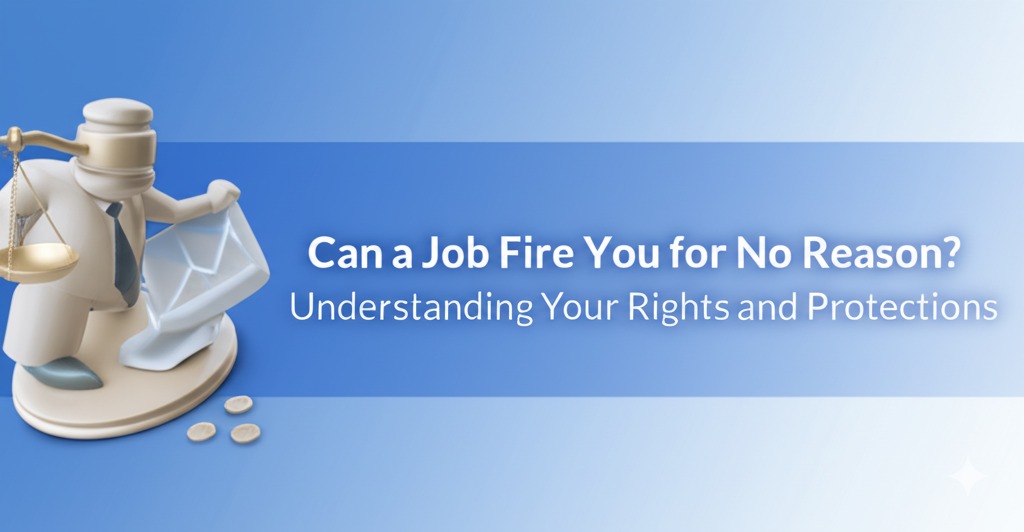
Introduction
Losing a job can be a stressful and life-altering experience, especially when it seems to happen without any clear reason. Many workers wonder, “Can my employer just fire me for no reason?” The answer depends on a number of factors, including your employment type, location, and the circumstances surrounding your dismissal. In this article, we’ll break down whether your employer can fire you without cause, explore the protections you may have, and provide guidance on what to do if you find yourself in this situation.
H2: At-Will Employment: What Does It Mean?
One of the key factors in understanding whether you can be fired without cause is the concept of at-will employment. In most places in the U.S., employment is presumed to be at-will unless otherwise specified. This means that either the employer or the employee can terminate the employment relationship at any time and for any reason, as long as the reason isn’t illegal.
H3: Exceptions to At-Will Employment
Although at-will employment allows employers to terminate employees at their discretion, there are important exceptions to this rule. These include:
- Discrimination: An employer cannot fire you based on your race, gender, religion, nationality, or any other protected class under federal, state, or local law.
- Retaliation: If you were fired for reporting illegal activity (whistleblowing) or asserting your rights, such as filing a workers’ compensation claim, that may be considered unlawful retaliation.
- Breach of Contract: If you have a written employment contract or a union agreement, your termination may be governed by specific rules that limit your employer’s ability to fire you at will.
H2: When Can Employers Legally Fire You?
While employers do have the right to fire employees in most situations, there are specific circumstances where they can legally do so:
- Poor performance: If your performance at work is not meeting the company’s standards, they may terminate your employment.
- Misconduct: Violations of company policies or unethical behavior, such as theft or harassment, can result in termination.
- Company needs: Downsizing, restructuring, or other business-related reasons may lead to layoffs, but they must be done in accordance with employment laws.
H3: Documenting the Termination Process
For both employers and employees, it’s essential that any termination process be well-documented. Employers should have a clear record of performance issues, misconduct, or any business reasons behind the firing decision. This can help ensure that the termination was not based on an unlawful or discriminatory reason.
H2: Employee Protections Against Unjust Termination
While at-will employment offers limited protection, there are laws and regulations in place to prevent wrongful termination. Here are some of the key protections:
- Anti-discrimination laws: Federal and state laws, such as the Civil Rights Act, Age Discrimination in Employment Act, and Americans with Disabilities Act, protect employees from discrimination based on protected characteristics.
- Family and Medical Leave Act (FMLA): If you take family or medical leave under the FMLA, your employer is generally prohibited from firing you during your leave.
- Whistleblower protections: Employees who report illegal activities or safety violations at work are protected from retaliation, including firing.
H3: What to Do If You’re Fired Without Cause
If you believe your termination was unlawful or unjust, here’s what you can do:
- Review your contract: If you have a written employment contract, check if it outlines termination procedures or reasons for firing.
- Ask for clarification: Contact your HR department to understand the reason for your termination. If the reason seems unclear or unjust, request more information.
- Consult an attorney: If you feel your firing was a violation of the law (discrimination, retaliation, etc.), consider consulting with an employment lawyer to understand your rights and options.
- File a complaint: If you believe discrimination or unlawful practices were involved, you can file a complaint with the Equal Employment Opportunity Commission (EEOC) or other local agencies.
H2: The Importance of Employment Contracts and Company Policies
While most employees in the U.S. are at-will, some companies offer employment contracts that outline the terms and conditions of the job, including protections against firing without cause. If you are in a role that requires such a contract, it’s crucial to understand its contents and how it may affect your job security.
H3: Benefits of Having a Written Agreement
A well-drafted employment contract can offer a layer of security, including:
- Clear termination guidelines: The contract will specify under what conditions your employment can be terminated.
- Severance pay: Some contracts include provisions for severance pay in case of termination.
- Notice periods: The contract may require the employer to provide a notice period before firing you.
H2: Conclusion: Can You Be Fired for No Reason?
In most cases, an employer can terminate an employee without providing a specific reason, as long as the termination does not violate any federal or state employment laws. However, employees are protected against unfair dismissal due to discrimination, retaliation, or breach of contract.
If you find yourself facing an unexpected termination, it’s crucial to understand your rights and consider seeking legal advice if you believe your dismissal was unlawful. Protect yourself by understanding your employment contract and workplace policies. Stay informed, and always know that you don’t have to face termination alone.

Andre Cuevas provides career insights, job search strategies, and professional advice to help individuals navigate the job market and achieve their career goals.





